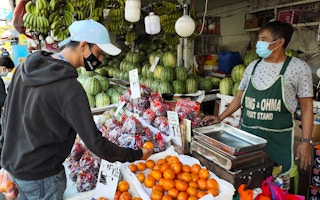The International Finance Corporation (IFC), the private investment arm of the World Bank Group, is funnelling US$150 million to the Union Bank of the Philippines’ social bond that aims to finance loans to micro, small and medium-sized enterprises (MSMEs) reeling from the Covid-19 crisis.
To continue reading, subscribe to Eco‑Business.
There's something for everyone. We offer a range of subscription plans.
- Access our stories and receive our Insights Weekly newsletter with the free EB Member plan.
- Unlock unlimited access to our content and archive with EB Circle.
- Publish your content with EB Premium.
The bond will be issued under the Union Bank’s new sustainable finance framework and is the first social bond by the lender.
It is also the second social bond of its kind in the Philippines following the Bank of the Philippine Islands’ sale of its own social bonds last year that likewise allowed an increase in its lending to pandemic-hit companies.
Union Bank’s social bond, which looks to raise money for projects with positive social outcomes such as improving healthcare and financing, is expected to finance over 2,000 loans to MSMEs and create tens of thousands of jobs over the next seven years, the IFC said in a statement on Friday.
“In the wake of the Covid-19 crisis, the use of social bonds to generate financing to meet the needs of vulnerable underserved people, including small businesses, will be critical to helping spur the recovery,” said Alfonso Garcia Mora, vice president, Asia and Pacific of IFC.
Before the pandemic, MSMEs accounted for over 90 per cent of businesses in the Philippines and over 60 per cent of jobs, but loans to these enterprises accounted for a mere 6 per cent of total bank loans in the country, according to data from the Asian Development Bank (ADB).
IFC added that its investment will help the country’s seventh largest bank boost financing for smaller firms through its supply chain financing platform, which uses digital technology to enable suppliers around the world to sell their receivables and optimise their cashflow by connecting them to large corporations and investors.
“
In the wake of the Covid-19 crisis, the use of social bonds to generate financing to meet the needs of vulnerable underserved people, including small businesses, will be critical to helping spur the recovery.
Alfonso Garcia Mora, vice president, Asia and Pacific, International Finance Corporation
“Our goal in issuing this bond is to support the recovery of MSMEs from the Covid-19 pandemic,” said Jose Emmanuel Hilado, chief financial officer of Union Bank. “We are confident that we can achieve this through the use of IFC’s long-term funding and by leveraging our supply chain financial platform. It could not have come at a better time, as this market segment has been hit particularly hard by the current crisis.”
The landmark deal highlights IFC’s first Covid-19 response social bond investment in Asia. Although it has been investing in social bonds since 2017, it doubled its investments in such securities last year after the coronavirus health crisis reached pandemic proportions.
At the end of 2020, IFC had issued 53 social bonds in public and private markets in 11 different currencies, supporting low-income communities and businesses during the pandemic.
The global sustainable debt market grew 29 per cent to a record US$732 billion last year, helped by a burst of bond issuance for social projects to cushion the effects of the pandemic. Social bond issuance jumped sevenfold to US$147.7 billion in 2020, as governments and companies borrowed for relief from the pandemic amid strong investor demand, according to BloombergNEF data.
There was a surge in social bond issuance in Asia at the height of the outbreak last year, increasing 22.3 times compared with growth of 9.8 times for Europe, according to an ADB report.
Globally, sustainable bond issuance likewise reached record highs in the first quarter this year as ailing economies have been resorting to such mechanisms to help aid recovery.












